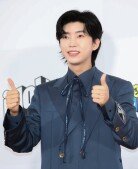President Park’s rusari in Iran
President Park’s rusari in Iran
Posted May. 04, 2016 07:33,
Updated May. 04, 2016 07:41
According to the British royal protocols that guide one’s behavior in the presence of Her Majesty, the Queen’s visitors should not say anything until she talks to them. There is the “no-touch” rule as well. This is why First Lady Michelle Obama stirred controversy for breaking the protocol when she put her arm around the Queen in a reception at Buckingham Palace in 2009.
There are debates over the fashion of President Park Geun-hye who is making a state visit to Iran wearing a rusari. A rusari is a kind of hijabs hiding one’s hair and neck. Some Internet users criticized the president, claiming that the president readily wore a hijab, a tool to suppress women, and has neither thoughts nor self-esteem. A Christian group issued a commentary titled “A Disgraceful Diplomacy,” saying that wearing a hijab means one is an Islamic believer. However, many refute such arguments. The simple belief that a hijab means the suppression of women is disparagement of Muslim women who want to keep their religious tradition and cultural identity. Some others supported President Park’s hijab, showing a picture of Queen Elizabeth II who wore a scarf around her head during her visit to Abu Dhabi as token of respect for the local tradition.
Ms. Obama exposed her hair in Saudi Arabia last year while she covered her hair with a scarf during her visit to Indonesia five years ago. What about Hillary Clinton as a former U.S. state secretary? Though she did not wear a hijab when he visited Saudi Arabia in 2012, she wore one during her visit to Pakistan in 2009. It depended on the situation even in different Islamic countries. The presidential office Cheong Wa Dae said that President Park decided to wear a rusari to show respect to the Islamic culture and the local laws. It also considered the fact that President Park is the first non-Islamic female leader who visits Iran since the 1979 Revolution.
In the movie “Kingsman,” there is a line like this: “Manners maketh man.” Manners mean treating others in the way that you want to be treated. True global manners start from respecting others while recognizing cultural differences. Making a good impression to the people of the visiting country is as important as economic cooperation in the diplomacy of the head of a state. You could easily reach a conclusion when you think about what you expect from your guest invited to your house.
고미석기자 mskoh119@donga.com
Headline News
- Med professors announce intention to leave hospitals starting Thursday
- Bridge honoring Sgt. Moon Jae-sik unveiled in Pennsylvania
- Chief of Staff Chung tells presidential secretaries to stay away from politics
- US FTC bans noncompete agreements
- N. Korea launches cyberattacks on S. Korea's defense companies







